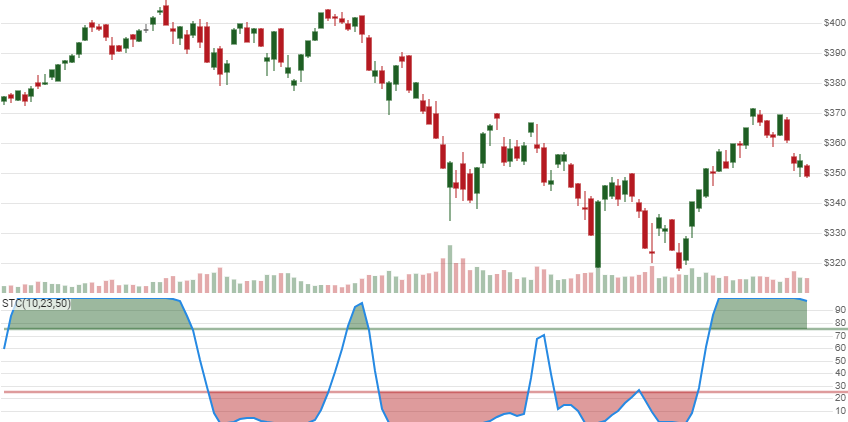Schaff Trend Cycle
Created by Doug Schaff, the Schaff Trend Cycle is a stochastic oscillator view of two converging/diverging exponential moving averages. In other words, it’s a Stochastic Oscillator of Moving Average Convergence / Divergence (MACD). [Discuss] 💬

// C# usage syntax
IEnumerable<StcResult> results =
quotes.GetStc(cyclePeriods, fastPeriods, slowPeriods);
Parameters
cyclePeriods int - Number of periods (C) for the Trend Cycle. Must be greater than or equal to 0. Default is 10.
fastPeriods int - Number of periods (F) for the faster moving average. Must be greater than 0. Default is 23.
slowPeriods int - Number of periods (S) for the slower moving average. Must be greater than fastPeriods. Default is 50.
Historical quotes requirements
You must have at least 2×(S+C) or S+C+100 worth of quotes, whichever is more, to cover the warmup and convergence periods. Since this uses a smoothing technique, we recommend you use at least S+C+250 data points prior to the intended usage date for better precision.
quotes is a collection of generic TQuote historical price quotes. It should have a consistent frequency (day, hour, minute, etc). See the Guide for more information.
Response
IEnumerable<StcResult>
- This method returns a time series of all available indicator values for the
quotesprovided. - It always returns the same number of elements as there are in the historical quotes.
- It does not return a single incremental indicator value.
- The first
S+Cslow periods will havenullvalues since there’s not enough data to calculate.
⚞ Convergence warning: The first
S+C+250periods will have decreasing magnitude, convergence-related precision errors that can be as high as ~5% deviation in indicator values for earlier periods.
StcResult
Date DateTime - Date from evaluated TQuote
Stc double - Schaff Trend Cycle
Utilities
See Utilities and helpers for more information.
Chaining
This indicator may be generated from any chain-enabled indicator or method.
// example
var results = quotes
.Use(CandlePart.HL2)
.GetStc(..);
Results can be further processed on Stc with additional chain-enabled indicators.
// example
var results = quotes
.GetStc(..)
.GetRsi(..);